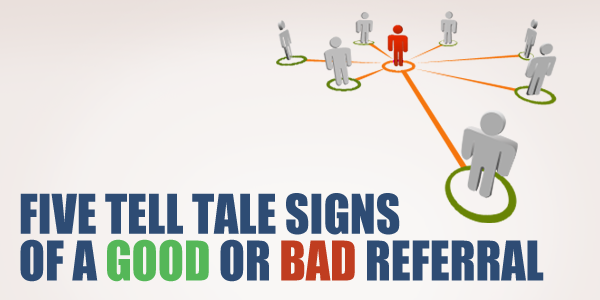Unlike what you have popularly heard, a bad lead is actually undesirable. As a businessperson, you may receive loads of referrals and leads but very few translate to a successful transaction. Here are 5 ways to know whether a referral is good or bad.
- Does the product or service solve a problem?
More often than not, a good referral leads to a sale. You can increase the chances of a successful transaction by judging the interest and desire of the prospect in your product or service. Determine whether or not they have an actual problem that can be solved with your company’s offerings. If they do, you are in business and if not, you should simply withdraw immediately as it will not lead to a sale.
- Is the individual qualified/authorized to make purchases?
Not every prospect you speak to, has the qualification or the authorization to make decisions about purchasing. Don’t waste time speaking with a Head of Department who has no power over purchasing when you can speak to the right team or even the senior management. If your prospect is an individual and not an organisation, you will still need to know the individual who has the final say on expenses. When you speak to the wrong person, your chances of failing increase simply because they have no authority over the decision to purchase.
- Do they have funds to cover purchases?
A potential prospect who is interested in your product or service does not always convert to a paying customer. You know that they are not serious about it unless they have made room in the budget specifically for your organisation. If you have details about them in your customer base, it helps to review their past communications and transactions to determine whether or not they are a good prospect for your company.
- Can they answer all your questions satisfactorily?
Before you begin the qualifying process, it is important to know the right questions to ask. You should also understand when to speak and when to listen. To evaluate the prospects, it is important to ask the right questions and listen to them. Inquire about who they are, what problems they have and how your product can solve their problems. Additionally, you should also enquire about when you can approach them with the sale. Listen to their answers carefully to determine how genuine and serious they are. You can also customise your product or service to better suit their needs with the right pitch.
- Is it the right time and place?
When it comes to evaluating your prospect, the matter of time and place is especially important. It may happen that your prospect may require your service or product, but may not need it immediately. The reasons for this may include anything from early planning, budgetary restraints or pending approvals. In this situation, it is better to note down their requirements and deadlines and contact them at the appointed time in the near future. This way, they are more likely to want your product or service and sign you.
